人教版(2019) 必修第二册 Unit 4 History and Traditions Reading and thinking 公开课课件-(35张ppt)
文档属性
| 名称 | 人教版(2019) 必修第二册 Unit 4 History and Traditions Reading and thinking 公开课课件-(35张ppt) |
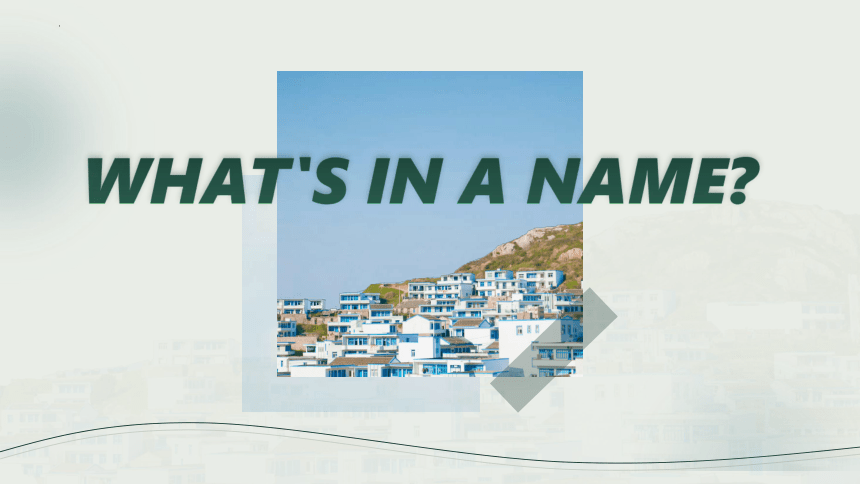
|
|
| 格式 | pptx | ||
| 文件大小 | 30.9MB | ||
| 资源类型 | 教案 | ||
| 版本资源 | 人教版(2019) | ||
| 科目 | 英语 | ||
| 更新时间 | 2023-01-29 10:58:37 | ||
图片预览

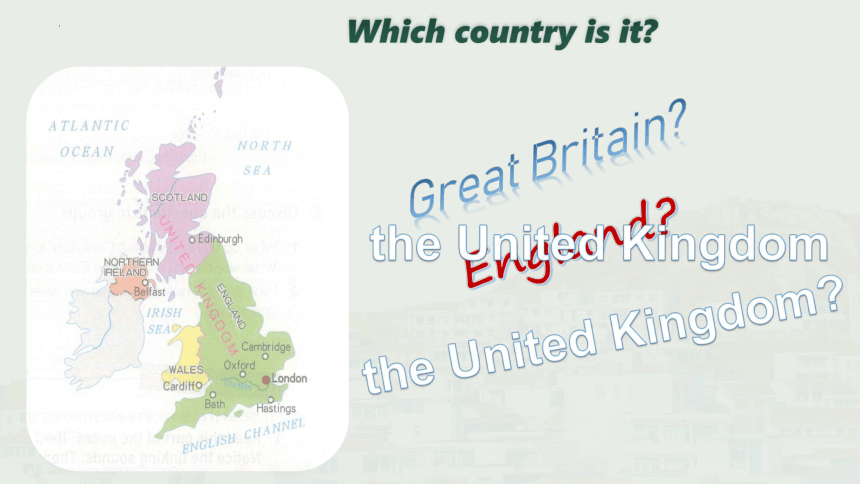
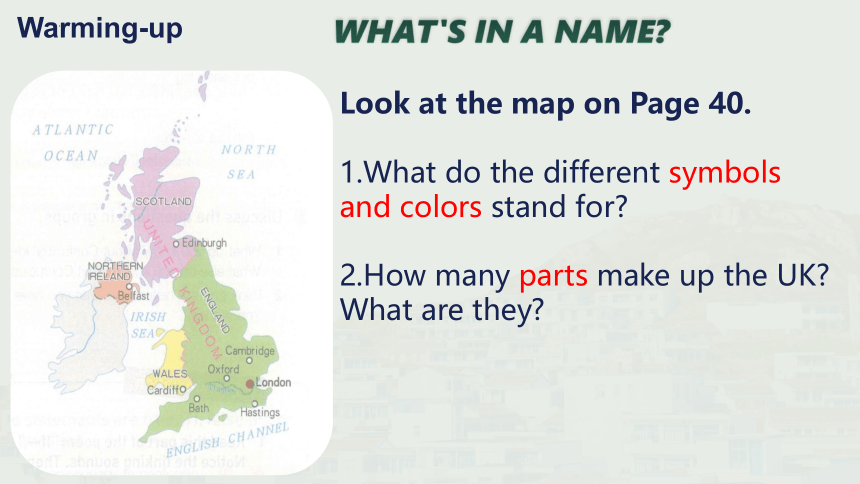
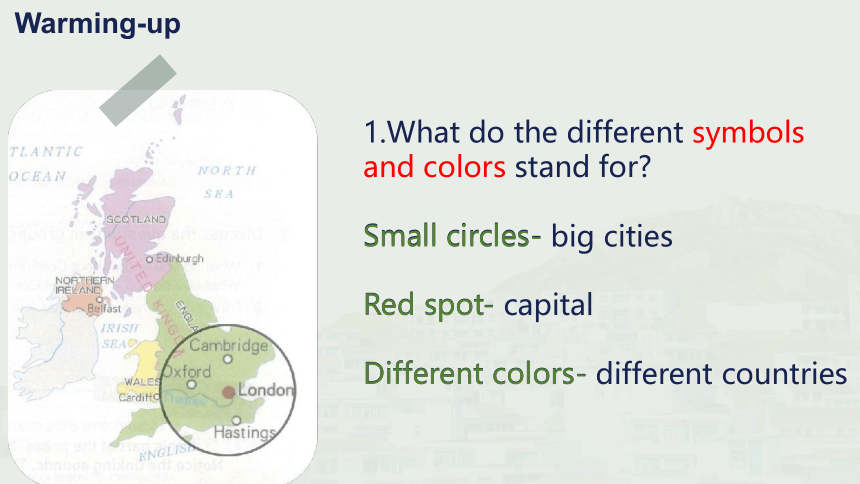
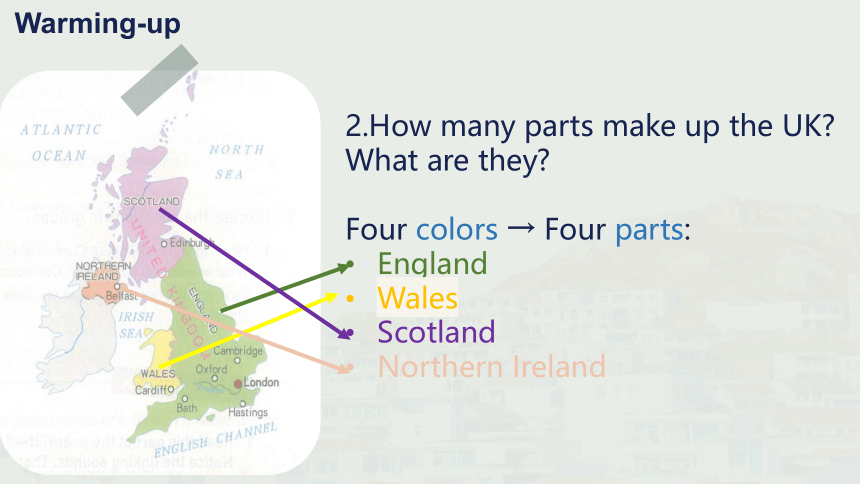
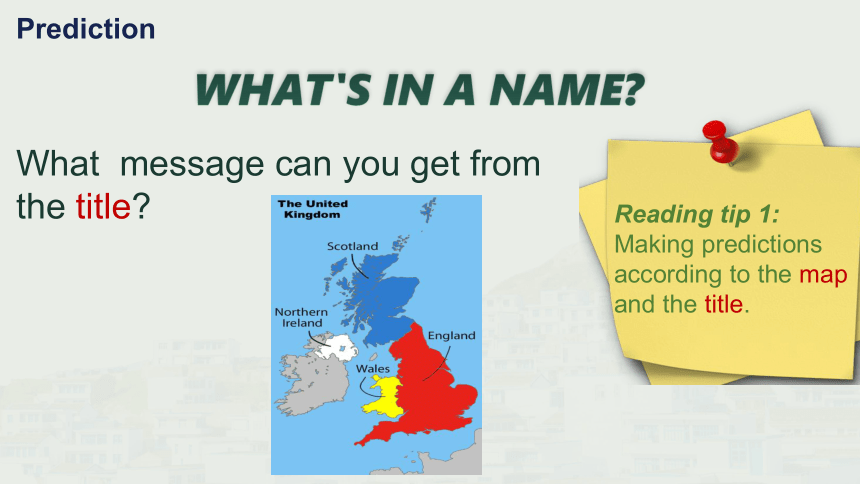
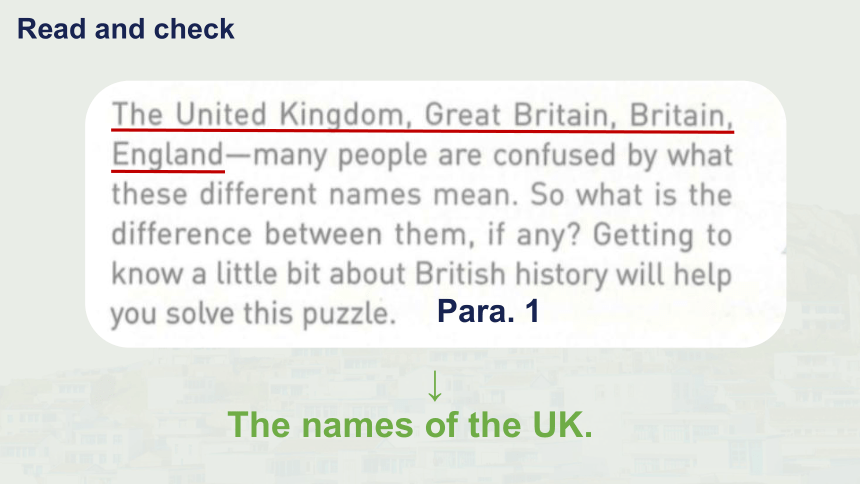
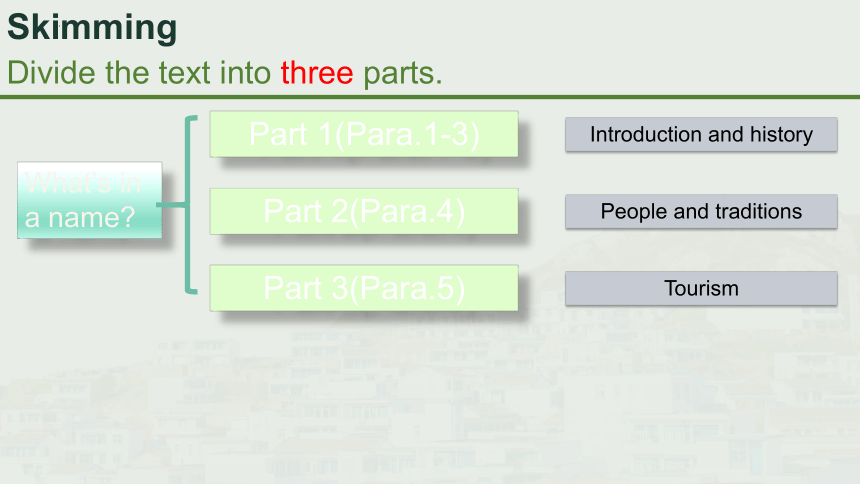
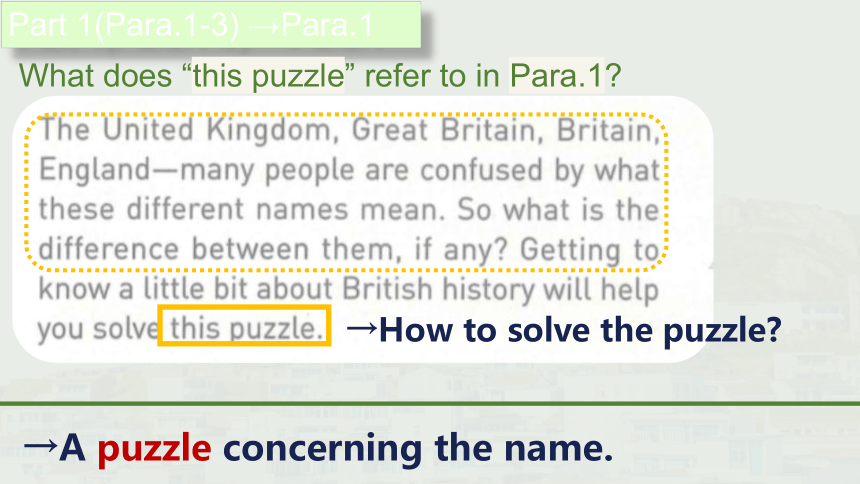
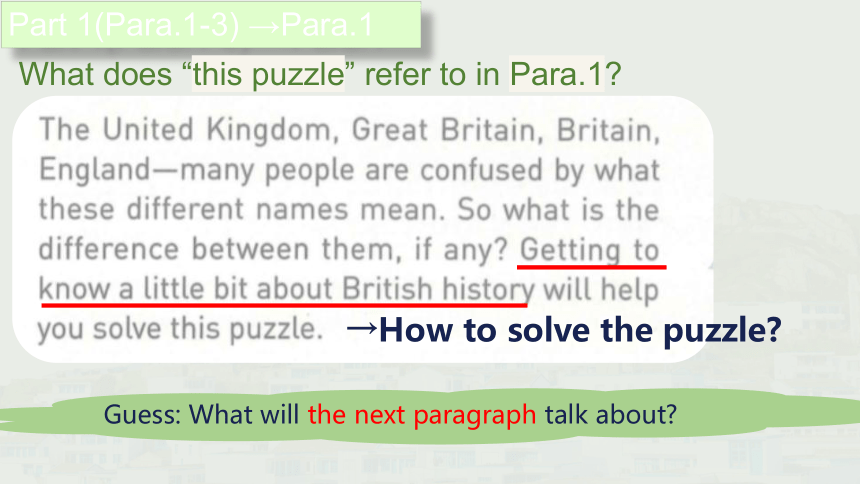
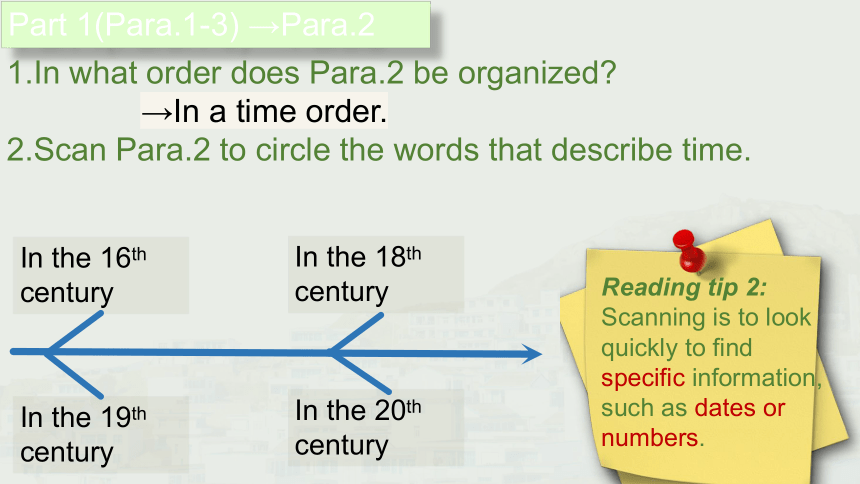
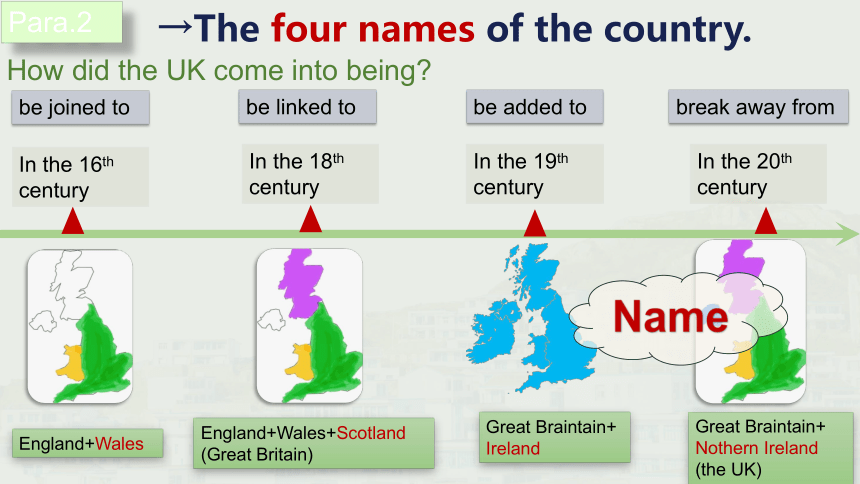
文档简介
(共35张PPT)
WHAT'S IN A NAME
Which country is it
Great Britain
England
the United Kingdom
the United Kingdom
Warming-up
Look at the map on Page 40.
1.What do the different symbols
and colors stand for
2.How many parts make up the UK
What are they
WHAT'S IN A NAME
Warming-up
1.What do the different symbols
and colors stand for
Small circles-
Red spot-
Different colors-
Small circles- big cities
Red spot- capital
Different colors- different countries
Warming-up
2.How many parts make up the UK
What are they
Four colors → Four parts:
England
Wales
Scotland
Northern Ireland
Prediction
WHAT'S IN A NAME
What message can you get from the title
Reading tip 1:
Making predictions according to the map and the title.
Read and check
Para. 1
↓
The names of the UK.
Skimming
Divide the text into three parts.
Part 1(Para.1-3)
Part 2(Para.4)
Part 3(Para.5)
Introduction and history
People and traditions
Tourism
What’s in a name
Part 1(Para.1-3) →Para.1
What does “this puzzle” refer to in Para.1
→A puzzle concerning the name.
→How to solve the puzzle
Part 1(Para.1-3) →Para.1
What does “this puzzle” refer to in Para.1
→How to solve the puzzle
Guess: What will the next paragraph talk about
Part 1(Para.1-3) →Para.2
Reading tip 2:
Scanning is to look quickly to find specific information, such as dates or numbers.
1.In what order does Para.2 be organized
→In a time order.
2.Scan Para.2 to circle the words that describe time.
In the 16th century
In the 18th century
In the 19th century
In the 20th century
Para.2
How did the UK come into being
In the 16th century
be joined to
be linked to
In the 18th century
In the 19th century
In the 20th century
be added to
break away from
England+Wales
England+Wales+Scotland
(Great Britain)
Great Braintain+
Ireland
Great Braintain+ Nothern Ireland
(the UK)
Name
→The four names of the country.
The UK
Para.2
Formation
Do the four countries work together in all areas
Part 1(Para.1-3) →Para3
Similarities and differences among the four countries:
Similarities:
flag
currency
military defense
→pond
the Union Jack
currency
: pond
:
Yuan
$:
dollar
?:
Euro
Part 1(Para.1-3) →Para3
Similarities and differences among the four countries:
Similarities:
flag
currency
military defense
→pond
the Union Jack
Part 1(Para.1-3) →Para3
Similarities and differences among the four countries:
Differences:
educational and
legal systems
national days
national dishes
football teams
Reading tip 3:
Giving examples can help readers understand the point more easily and more convincing.
Systems
Part 2(Para.4)
Group
Time
Changes
Reading tip 4:
Scanning is to look quickly to find specific information, such as capitalized words.
Part 2(Para.4)
The 1st C
Romans
towns & roads
Group
Time
Changes
Part 2(Para.4)
Group
Time
Changes
The 5th C
Anglo-Saxons
language & houses
Part 2(Para.4)
Group
Time
Changes
The 8th C
Vikings
vocabulary & names of locations
Whitby, Copmanthorpe
Part 2(Para.4)
Group
Time
Changes
The 11th C
Normans
castles & legal system & French words
Part 2(Para.4)
The 1st C
Romans
towns & roads
Group
Time
Changes
The 5th C
Anglo-Saxons
language & houses
The 8th C
Vikings
vocabulary & names of locations
The 11th C
Normans
castles & legal system & French words
people
a long history
different groups
rich cultures
→Four groups of people in the history.
Part 3(Para.5)——Tourism
Where does the writer suggest as a starting place to visit Why
London
Part 3(Para.5)——Tourism
Where does the writer suggest as a starting place to visit Why
London
It is a port city that has a history dating all the way
back to Roman times.
Part 3(Para.5)——Tourism
Where does the writer suggest as a starting place to visit Why
London
countless historic sites and lots of museums
Part 3(Para.5)——Tourism
Where does the writer suggest as a starting place to visit Why
London
a fascinating mix of history and modern culture
Part 3(Para.5)——Tourism
Where does the writer suggest as a starting place to visit Why
London
new and old traditions
Part 3(Para.5)——Tourism
Where does the writer suggest as a starting place to visit Why
London
It is a port city that has a history dating all the way
back to Roman times.
countless historic sites and lots of museums
a fascinating mix of history and modern culture
new and old traditions
tourism
WHAT'S IN A NAME
name
systems
formation
people
tourism
…
History & Culture
Why is it important to study history and culture of a country before visiting it
Group discussion
It will help you understand the place better and have a more enjoyable experience.
You will be able to interact better with the people and their culture and have a richer experience.
. . .
Group work
Imagine you are the guide in your group.
Please introduce the history of the UK for your group members.
Later, each group choose one BEST guide.
Use the timeline to help you.
1st C
Romans arrived
5th C
Anglo-Saxons came
8th C
Vikings came
11th C
Normans conquered England after the Battle of Hastings
16th C
Wales was joined to Kingdom of England
19th C
Ireland was added
18th C
Scotland was joined to England and Wales
20th C
The southern part of Ireland broke away
Homework
What important things should visitors know about before they come to Chongqing
Tip 1
Tip 2
Tip 3
Tip 4
…
THANKS
WELCOME TO Chongqing
WHAT'S IN A NAME
Which country is it
Great Britain
England
the United Kingdom
the United Kingdom
Warming-up
Look at the map on Page 40.
1.What do the different symbols
and colors stand for
2.How many parts make up the UK
What are they
WHAT'S IN A NAME
Warming-up
1.What do the different symbols
and colors stand for
Small circles-
Red spot-
Different colors-
Small circles- big cities
Red spot- capital
Different colors- different countries
Warming-up
2.How many parts make up the UK
What are they
Four colors → Four parts:
England
Wales
Scotland
Northern Ireland
Prediction
WHAT'S IN A NAME
What message can you get from the title
Reading tip 1:
Making predictions according to the map and the title.
Read and check
Para. 1
↓
The names of the UK.
Skimming
Divide the text into three parts.
Part 1(Para.1-3)
Part 2(Para.4)
Part 3(Para.5)
Introduction and history
People and traditions
Tourism
What’s in a name
Part 1(Para.1-3) →Para.1
What does “this puzzle” refer to in Para.1
→A puzzle concerning the name.
→How to solve the puzzle
Part 1(Para.1-3) →Para.1
What does “this puzzle” refer to in Para.1
→How to solve the puzzle
Guess: What will the next paragraph talk about
Part 1(Para.1-3) →Para.2
Reading tip 2:
Scanning is to look quickly to find specific information, such as dates or numbers.
1.In what order does Para.2 be organized
→In a time order.
2.Scan Para.2 to circle the words that describe time.
In the 16th century
In the 18th century
In the 19th century
In the 20th century
Para.2
How did the UK come into being
In the 16th century
be joined to
be linked to
In the 18th century
In the 19th century
In the 20th century
be added to
break away from
England+Wales
England+Wales+Scotland
(Great Britain)
Great Braintain+
Ireland
Great Braintain+ Nothern Ireland
(the UK)
Name
→The four names of the country.
The UK
Para.2
Formation
Do the four countries work together in all areas
Part 1(Para.1-3) →Para3
Similarities and differences among the four countries:
Similarities:
flag
currency
military defense
→pond
the Union Jack
currency
: pond
:
Yuan
$:
dollar
?:
Euro
Part 1(Para.1-3) →Para3
Similarities and differences among the four countries:
Similarities:
flag
currency
military defense
→pond
the Union Jack
Part 1(Para.1-3) →Para3
Similarities and differences among the four countries:
Differences:
educational and
legal systems
national days
national dishes
football teams
Reading tip 3:
Giving examples can help readers understand the point more easily and more convincing.
Systems
Part 2(Para.4)
Group
Time
Changes
Reading tip 4:
Scanning is to look quickly to find specific information, such as capitalized words.
Part 2(Para.4)
The 1st C
Romans
towns & roads
Group
Time
Changes
Part 2(Para.4)
Group
Time
Changes
The 5th C
Anglo-Saxons
language & houses
Part 2(Para.4)
Group
Time
Changes
The 8th C
Vikings
vocabulary & names of locations
Whitby, Copmanthorpe
Part 2(Para.4)
Group
Time
Changes
The 11th C
Normans
castles & legal system & French words
Part 2(Para.4)
The 1st C
Romans
towns & roads
Group
Time
Changes
The 5th C
Anglo-Saxons
language & houses
The 8th C
Vikings
vocabulary & names of locations
The 11th C
Normans
castles & legal system & French words
people
a long history
different groups
rich cultures
→Four groups of people in the history.
Part 3(Para.5)——Tourism
Where does the writer suggest as a starting place to visit Why
London
Part 3(Para.5)——Tourism
Where does the writer suggest as a starting place to visit Why
London
It is a port city that has a history dating all the way
back to Roman times.
Part 3(Para.5)——Tourism
Where does the writer suggest as a starting place to visit Why
London
countless historic sites and lots of museums
Part 3(Para.5)——Tourism
Where does the writer suggest as a starting place to visit Why
London
a fascinating mix of history and modern culture
Part 3(Para.5)——Tourism
Where does the writer suggest as a starting place to visit Why
London
new and old traditions
Part 3(Para.5)——Tourism
Where does the writer suggest as a starting place to visit Why
London
It is a port city that has a history dating all the way
back to Roman times.
countless historic sites and lots of museums
a fascinating mix of history and modern culture
new and old traditions
tourism
WHAT'S IN A NAME
name
systems
formation
people
tourism
…
History & Culture
Why is it important to study history and culture of a country before visiting it
Group discussion
It will help you understand the place better and have a more enjoyable experience.
You will be able to interact better with the people and their culture and have a richer experience.
. . .
Group work
Imagine you are the guide in your group.
Please introduce the history of the UK for your group members.
Later, each group choose one BEST guide.
Use the timeline to help you.
1st C
Romans arrived
5th C
Anglo-Saxons came
8th C
Vikings came
11th C
Normans conquered England after the Battle of Hastings
16th C
Wales was joined to Kingdom of England
19th C
Ireland was added
18th C
Scotland was joined to England and Wales
20th C
The southern part of Ireland broke away
Homework
What important things should visitors know about before they come to Chongqing
Tip 1
Tip 2
Tip 3
Tip 4
…
THANKS
WELCOME TO Chongqing
